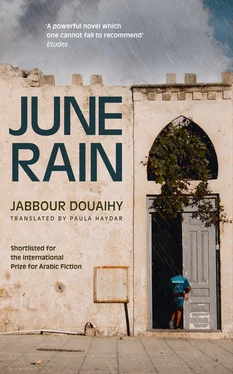His relatives were going to seek revenge. It was incumbent upon them never to forget his death for one second. Their blood couldn’t bear it for very long. They started ambushing roads at night. Three or four of them would get together and then get out of sight. They would get them sooner or later — the brothers of their brothers’ killers or their distant relatives, it didn’t matter.
From now on, Kamileh wouldn’t do a thing and nothing would be demanded of her. She was frustrated at the killers and frustrated at with the ones who had made her marry him in the first place. She was no longer under any obligation to open her door to anyone, no longer obliged to anyone, least of all his relatives. She would be satisfied to sit beside Muntaha, two absent-minded fools sitting on wicker stools in the summer humidity, while a gentle breeze rose up from the nearby river or the smell of eel wafted around near the mute fisherman. She relaxed her body with total abandon and gabbed with Muntaha about everybody’s business. No one escaped their tongues. They accused every woman who wore blusher and make-up of marital infidelity, and anyone who got a new car or new furniture of stealing and cheating. No one passed along the road without getting their share of that pair’s dirty, scrutinising looks and cutting words.
During her time alone she planted flowers on the balcony, flowers for every season. She checked on the progress of those little lives, helped them along and tied their tender skinny branches with strings. She watered them, pruned them and got mad at them if they got lazy. And later Kamileh’s neighbours would insist that, after spending years by herself after Eliyya left for America, she started talking quietly to her flowers without realising it, sometimes encouraging them and other times chastising them.
That was to be her sole project in life. She wouldn’t visit anyone except her mother; those who liked her could come to her. She would sleep through the night without tossing and turning in bed anymore; no more hanging in limbo for hours on end, waiting for her husband to come back from gambling parties he never once took her to and which she had no concept of — except to imagine they were filled with bright lights in spacious, high-ceilinged rooms, swarming with seductive women in black dresses exposing their breasts and backs. They were parties that lasted until dawn, when Yusef would tiptoe back home and timidly open the door, trying not to wake her and have her smell other women on him.
‘He has lots of tough cousins. They will avenge him!’
She wouldn’t remarry, because someone who is murdered remains forever present, hovering like an eagle over his widow’s head until she dies herself. He would remain like a sword over her, even if they avenged him and wreaked havoc for his sake. They’d nudge her to get married, but she wouldn’t do it, and they knew she wouldn’t, and besides, there wasn’t anyone who would come asking for her.
She didn’t want to get married again. She had never wanted to in the first place. They had pushed her into it the moment she showed the slightest interest.
‘Get married, Kamileh. Your sisters are waiting.’
She was the prettiest of them and the youngest, too. Whenever a young suitor came their way, she was the only one he liked. Young men liked her without any effort on her part, while she, on the other hand, tried to keep out of sight. She wasn’t going to get married and wasn’t going to let any of her sisters get married. Then Yusef al-Kfoury came asking for her hand. She warmed to him and they sensed it and didn’t give her any time.
‘They didn’t give me time to love him,’ she said. She loved him later on, loved him very much, and the more her hopes of having children dampened, the stronger she clung to him. They packed up her clothes and sneaked her out the back door so as not to give her mother a chance to protest. Her mother had insisted on marrying off her eldest daughter first. ‘Each one in her turn!’ Kamileh eloped, but her mother got over it in less than a month.
He was shot twice. People said they didn’t even give him a chance to pull out his gun. Someone called him by name, so he turned and they shot him, from more than one gun. They said that whoever called his name to make him turn around was not one of the men who shot him. He left her the house she was living in and nothing more. The family offered her money, gifts from rich people or expatriates, which she politely turned down. She was the only one among those whose husbands were killed at Burj al-Hawa who refused compensation. She didn’t want money in return for him. She would never stop wearing black, would never buy new clothes for herself. She went back to where she always wanted to be, there on her balcony where they could forget all about her as she sat drinking coffee with Muntaha and planted, watered and talked to her flowers. Her body was all her own; it wasn’t anybody’s business and she wasn’t going to demand anything of it either.
However, her life’s détente wasn’t to last very long.
One month, no more.
Then the warning came and she returned to battle. The warning came from her own body, which she had thought was going to rest and allow her to rest, too. She started feeling more and more each day that something was waking up inside her, that her body seemed to be slipping from her. Her period was late. She’d get sudden headaches, every day at nightfall, sudden and severe headaches. She assumed it all had to do with her grief, or at least that’s what everyone said. More and more signs of pregnancy began to appear, but she didn’t want to believe it. She didn’t want it, full stop.
The first one to notice was Yasmeen, her married sister in Beirut. Every time she came to see her she would start with complaints. Her husband never wanted her to come; he’d send her by herself by taxi, and he didn’t want her to bring any of the children. ‘Yasmeen,’ he’d say to her, ‘staying far away from them all is for the best!’ By ‘them all’ he meant the town his wife was born in and all its people.
Yasmeen would retort that her heart filled with joy the moment the taxi went through the Chekka tunnel and she could see the north. She’d roll down the window and suck in a deep breath of air. But then the sorrow would come back to her once she saw her sister Kamileh.
‘Luck is for whores, my sister. It’s all in God’s hands.’
Then Yasmeen would chastise Kamileh to go fix her hair and take better care of her appearance and eat. She’d go on about women their mother’s age who hadn’t yet given up on looking elegant.
It was the cravings that gave Kamileh away. She longed for fruits that weren’t in season, in front of her sister. ‘I want fresh dates, Yasmeen!’
‘What on earth made you think of fresh dates this time of year?’
Yasmeen looked her up and down and after thinking about it a little she asked, ‘Are you pregnant, Kamileh?’
Kamileh laughed sarcastically. She wasn’t pregnant. But what exactly was happening to her?
‘How could I be pregnant?’
‘Why couldn’t you be pregnant, sister?’
Kamileh burst out, ‘Who could I be pregnant from?’
And so Yasmeen screamed in her turn, ‘Your husband… It’s been less than a month since he died hasn’t it?’
Kamileh was lost in thought for a moment.
‘No, no. Not possible.’
‘Tell me, when did you sleep with him? Tell me…’
Kamileh felt a burning sensation in her throat. ‘Saturday night. They killed him on Sunday.’
‘Shall I come stay with you, Kamileh? I’ll go home and get everything in order there and come back tomorrow.’
‘No, you go home,’ Kamileh refused. ‘I don’t need any help.’
A couple days later she threw up, for no reason. It was still morning before breakfast, and she was home alone. That was at the end of July. Weapons started arriving in town on mule-back, smuggled weapons. Strangers who were said to be army officers, camouflaged in civilian clothes, drove the mules. They crossed the river over wooden bridges that had been quickly built for that purpose in an area that was not in plain view. They unloaded the shipment near the flour mill where the men of the family tried out the rifles by shooting at the trunks of some nearby poplar trees. They whistled in amazement every time they went to inspect the marks the bullets made on the trees. People said weapons came from Syria to the other side, too. They arrived from inside the city, from the old souk where the fighters were hunkering down. They would load them up and take them up across the river, too. Before noon, war planes passed by flying low, keeping an eye on both sides, as they said.
Читать дальше












